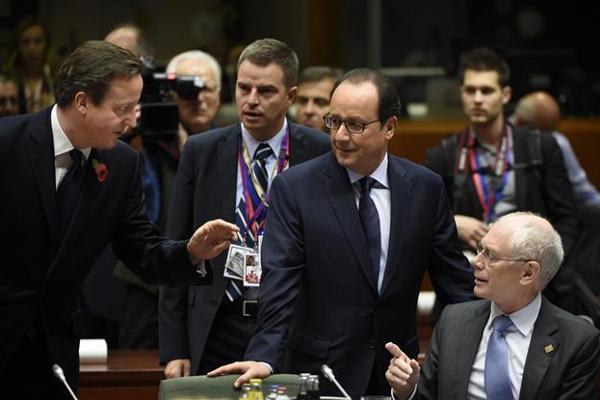Britain slams EU budget demand, others see ‘molehills’
BRUSSELS/LONDON - Reuters


Britain Prime Minister David Cameron (L) speaks with French President Francois Hollande,and EU Council President Herman Van Rompuyon as an advisr looks on, during the second day of the European Union Summit at the EU Headquarters in Brussels, on October 24, 2014. AFP Photo
British Prime Minister David Cameron challenged a demand from the European Union for an additional 2.1-billion-euro payment into this year’s EU budget after a revision of economic statistics showed his country was better off.EU leaders, scrambling to defuse a potentially damaging row with London, agreed at a summit in Brussels that their finance ministers would hold emergency talks with the executive European Commission to review the figures in the coming weeks, diplomats said. A note from the Commission to member states set a deadline of Dec. 1 for payment.
Cameron’s Eurosceptic opponents, gaining ground fast on his Conservative party ahead of a May election, seized on what EU officials called an unusually extensive version of the regular annual adjustment. They accused the prime minister of misleading voters and the EU of acting like a “thirsty vampire”.
“David Cameron once claimed that he had reduced the EU budget, but the UK contribution went up and now quite incredibly, our contribution goes up a second time. It’s just outrageous,” said Nigel Farage, leader of the UK Independence Party, which wants to pull Britain out of the EU.
“The EU is like a thirsty vampire feasting on UK taxpayers’ blood. We need to protect the innocent victims who are us.”
Even Cameron’s pro-European Liberal Democrat coalition partners, led by Deputy Prime Minister Nick Clegg, said it was unacceptable to change membership fees “at the drop of a hat”.
Several fellow EU leaders urged Britain to respect long-standing EU rules and not blow an accounting exercise out of proportion. Finland’s prime minister said Cameron should not to make “mountains out of molehills”.
Cameron raised the issue on the second day of an EU summit, and European Commission President Jose Manuel Barroso responded that the rules were the rules and should not be called into question, an EU official said.
The change was based on updated figures for gross national income supplied by Britain’s Office of National Statistics. London had received cash back when the financial crisis shrunk its economy in 2008. In recent years, its contribution had been adjusted upwards by up to 500 million euros ($632 million) a year on average without any objection, the official said.
German Chancellor Angela Merkel and French President Francois Hollande also told Cameron the rules must be respected, while the Italian and Dutch prime ministers voiced support for Britain, according to the official.
